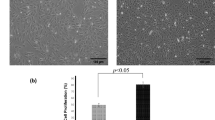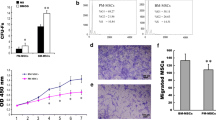Abstract
Objective
This research was performed to explore the effect of macrophage migration inhibitory factor (MIF) on the apoptosis of bone marrow mesenchymal stem cells (BMSCs) in ischemia and hypoxia environments.
Methods
The cell viability of BMSCs incubated under hypoxia/ischemia (H/I) conditions with or without pretreatment with MIF or triglycidyl isocyanurate (TGIC) was detected using cell counting kit-8 (CCK-8) analysis. Plasmids containing long noncoding RNA (lncRNA) maternally expressed gene 3 (MEG3) or β-catenin small interfering RNA (siRNA) were used to overexpress or downregulate the corresponding gene, and the p53 signaling pathway was activated by pretreatment with TGIC. The influences of MIF, overexpression of lncRNA MEG3, activation of the p53 signaling pathway, and silencing of β-catenin on H/I-induced apoptosis of BMSCs were revealed by western blotting, flow cytometry, and terminal deoxynucleotidyl transferase (TdT)-mediated dUTP nick-end labeling (TUNEL) staining.
Results
From the results of CCK-8 assay, western blotting, and flow cytometry, pretreatment with MIF significantly decreased the H/I-induced apoptosis of BMSCs. This effect was inhibited when lncRNA MEG3 was overexpressed by plasmids containing MEG3. The p53 signaling pathway was activated by TGIC, and β-catenin was silenced by siRNA. From western blot results, the expression levels of β-catenin in the nucleus and phosphorylated p53 (p-p53) were downregulated and upregulated, respectively, when the lncRNA MEG3 was overexpressed. Through flow cytometry, MIF was also shown to significantly alleviate the increased reactive oxygen species (ROS) level of BMSCs caused by H/I.
Conclusions
In summary, we conclude that MIF protected BMSCs from H/I-induced apoptosis by downregulating the lncRNA MEG3/p53 signaling pathway, activating the Wnt/β-catenin signaling pathway, and decreasing ROS levels.
概要
目的
探讨巨噬细胞迁移抑制因子(MIF)在缺氧/缺血(H/I)环境下对骨髓间充质干细胞(BMSCs)凋亡的影响。
创新点
(1)阐明了长链非编码RNA(lncRNA)MEG3在H/I诱导的小鼠BMSCs凋亡中的作用;(2)发现MIF可以通过调节lncRNA MEG3/p53信号通路缓解H/I介导的BMSCs凋亡;(3)MIF的细胞保护作用还与激活Wnt/β-连环蛋白(β-catenin)信号通路和降低活性氧(ROS)水平相关。
方法
采用细胞计数试剂8(CCK-8)法检测H/I条件下BMSCs有或无MIF或异氰脲酸甘油三酯(TGIC)预处理对细胞活力的影响。利用含有lncRNA MEG3的质粒或β-catenin小干扰RNA过表达或下调相应基因,并使用TGIC预处理激活p53信号通路,然后进一步检测MIF对H/I环境下BMSCs的保护作用。
结果
CCK-8、蛋白质印迹法和流式细胞术检测结果显示:MIF预处理可显著降低细胞内的ROS水平,改善H/I诱导的BMSCs凋亡;LncRNA MEG3过表达时细胞核内β-catenin的含量明显减少,而p-p53的表达上调;当p53信号通路被激活,β-catenin的表达被抑制时,MIF对H/I环境下BMSCs的保护作用明显减弱。
结论
MIF通过下调lncRNA MEG3/p53信号通路、激活Wnt/β-catenin信号通路和降低ROS水平来保护BMSCs免受H/I诱导的凋亡。
Similar content being viewed by others
References
Böttcher A, Büttner M, Tritschler S, et al., 2021. Non-canonical Wnt/PCP signalling regulates intestinal stem cell lineage priming towards enteroendocrine and paneth cell fates. Nat Cell Biol, 23(1):23–31. https://doi.org/10.1038/s41556-020-00617-2
Calandra T, Bernhagen J, Mitchell RA, et al., 1994. The macro-phage is an important and previously unrecognized source of macrophage migration inhibitory factor. J Exp Med, 179(6):1895–1902. https://doi.org/10.1084/jem.179.6.1895
Chen RP, Huang ZL, Liu LX, et al., 2016. Involvement of endoplasmic reticulum stress and p53 in lncRNA MEG3-induced human hepatoma HepG2 cell apoptosis. Oncol Rep, 36(3):1649–1657. https://doi.org/10.3892/or.2016.4919
Du R, Li J, Wu YT, 2020. Expression of SFRP1 and MIF in elderly patients with severe periodontitis and its correlation with cognitive function. Shanghai J Stomatol, 29(1):97–101 (in Chinese). https://doi.org/10.19439/j.sjos.2020.01.020
Fan LH, Zhang C, Yu ZF, et al., 2015. Transplantation of hypoxia preconditioned bone marrow mesenchymal stem cells enhances angiogenesis and osteogenesis in rabbit femoral head osteonecrosis. Bone, 81:544–553. https://doi.org/10.1016/j.bone.2015.09.005
Fukaya R, Ohta S, Yaguchi T, et al., 2016. MIF maintains the tumorigenic capacity of brain tumor-initiating cells by directly inhibiting p53. Cancer Res, 76(9):2813–2823. https://doi.org/10.1158/0008-5472.Can-15-1011
George G, Lane JM, 2022. Osteonecrosis of the femoral head. J Am Acad Orthop Surg Glob Res Rev, 6(5):e21.00176. https://doi.org/10.5435/JAAOSGlobal-D-21-00176
Hines JT, Jo WL, Cui QJ, et al., 2021. Osteonecrosis of the femoral head: an updated review of arco on pathogenesis, staging and treatment. J Korean Med Sci, 36(24):e177. https://doi.org/10.3346/jkms.2021.36.e177
Hou M, Cui JJ, Liu JJ, et al., 2014. Angiopoietin-like 4 confers resistance to hypoxia/serum deprivation-induced apoptosis through PI3K/Akt and ERK1/2 signaling pathways in mesenchymal stem cells. PLoS ONE, 9(1):e85808. https://doi.org/10.1371/journal.pone.0085808
Jarroux J, Morillon A, Pinskaya M, 2017. History, discovery, and classification of lncRNAs. In: Rao MRS (Ed.), Long Non Coding RNA Biology. Springer, Singapore, p.1–46. https://doi.org/10.1007/978-981-10-5203-3_1
Jiao DL, Zheng A, Liu Y, et al., 2021. Bidirectional differentiation of BMSCs induced by a biomimetic procallus based on a gelatin-reduced graphene oxide reinforced hydrogel for rapid bone regeneration. Bioact Mater, 6(7):2011–2028. https://doi.org/10.1016/j.bioactmat.2020.12.003
Jung C, Kim MH, Kim YY, et al., 2021. Determining the optimal administration conditions under which MIF exerts neuroprotective effects by inducing BDNF expression and inhibiting apoptosis in an in vitro stroke model. Brain Sci, 11(2):280. https://doi.org/10.3390/brainsci11020280
Kim SH, Wang WH, Wang JP, et al., 2018. Teroxirone suppresses growth and motility of human hepatocellular carcinoma cells. Biomed Pharmacother, 99:997–1008. https://doi.org/10.1016/j.biopha.2018.01.157
Ma J, Li TF, Han XW, et al., 2019. Downregulated MEG3 contributes to tumour progression and poor prognosis in oesophagal squamous cell carcinoma by interacting with miR-4261, downregulating DKK2 and activating the Wnt/β-catenin signalling. Artif Cells Nanomed Biotechnol, 47(1):1513–1523. https://doi.org/10.1080/21691401.2019.1602538
Qiu GZ, Tian W, Fu HT, et al., 2016. Long noncoding RNA-MEG3 is involved in diabetes mellitus-related microvascular dysfunction. Biochem Biophys Res Commun, 471(1):135–141. https://doi.org/10.1016/j.bbrc.2016.01.164
Sarkar D, Leung EY, Baguley BC, et al., 2015. Epigenetic regulation in human melanoma: past and future. Epigenetics, 10(2):103–121. https://doi.org/10.1080/15592294.2014.1003746
Song HL, Shen Q, Hu S, et al., 2020. The role of macrophage migration inhibitory factor in promoting benign prostatic hyperplasia epithelial cell growth by modulating COX-2 and P53 signaling. Biol Open, 9(11):bio053447. https://doi.org/10.1242/bio.053447
Uroda T, Anastasakou E, Rossi A, et al., 2019. Conserved pseudoknots in lncRNA MEG3 are essential for stimulation of the p53 pathway. Mol Cell, 75(5):982–995.e9. https://doi.org/10.1016/j.molcel.2019.07.025
Wajner M, Vargas CR, Amaral AU, 2020. Disruption of mitochondrial functions and oxidative stress contribute to neurologic dysfunction in organic acidurias. Arch Biochem Biophys, 696:108646. https://doi.org/10.1016/j.abb.2020.108646
Wirtz TH, Saal A, Bergmann I, et al., 2021. Macrophage migration inhibitory factor exerts pro-proliferative and anti-apoptotic effects via CD74 in murine hepatocellular carcinoma. Br J Pharmacol, 178(22):4452–4467. https://doi.org/10.1111/bph.15622
Xia WZ, Hou M, 2016. Macrophage migration inhibitory factor induces autophagy to resist hypoxia/serum deprivation-induced apoptosis via the AMP-activated protein kinase/mammalian target of rapamycin signaling pathway. Mol Med Rep, 13(3):2619–2626. https://doi.org/10.3892/mmr.2016.4847
Xia WZ, Xie CY, Jiang MM, et al., 2015. Improved survival of mesenchymal stem cells by macrophage migration inhibitory factor. Mol Cell Biochem, 404(1–2):11–24. https://doi.org/10.1007/s11010-015-2361-y
Xia WZ, Zhuang L, Hou M, 2018. Role of lincRNA-p21 in the protective effect of macrophage inhibition factor against hypoxia/serum deprivation-induced apoptosis in mesenchymal stem cells. Int J Mol Med, 42(4):2175–2184. https://doi.org/10.3892/ijmm.2018.3767
Xia Y, He ZC, Liu B, et al., 2015. Downregulation of Meg3 enhances cisplatin resistance of lung cancer cells through activation of the WNT/β-catenin signaling pathway. Mol Med Rep, 12(3):4530–4537. https://doi.org/10.3892/mmr.2015.3897
Xie B, Qiao ML, Xuan JL, 2021. LncRNA MEG3 downregulation relieves intracerebral hemorrhage by inhibiting oxidative stress and inflammation in an miR-181b-dependent manner. Med Sci Monit, 27:e929435. https://doi.org/10.12659/MSM.929435
Xu HX, Wang CQ, Liu C, et al., 2021. Cotransplantation of mesenchymal stem cells and endothelial progenitor cells for treating steroid-induced osteonecrosis of the femoral head. Stem Cells Transl Med, 10(5):781–796. https://doi.org/10.1002/sctm.20-0346
Xu JH, Su CJ, Zhao FL, et al., 2018. Paclitaxel promotes lung cancer cell apoptosis via MEG3-P53 pathway activation. Biochem Biophys Res Commun, 504(1):123–128. https://doi.org/10.1016/j.bbrc.2018.08.142
Yan HL, Yuan JP, Gao LK, et al., 2016. Long noncoding RNA MEG3 activation of p53 mediates ischemic neuronal death in stroke. Neuroscience, 337:191–199. https://doi.org/10.1016/j.neuroscience.2016.09.017
Yoshihisa Y, Rehman MU, Kondo T, et al., 2016. Role of macrophage migration inhibitory factor in heat-induced apoptosis in keratinocytes. FASEB J, 30(11):3870–3877. https://doi.org/10.1096/fj.201600408RR
Yu H, Li SB, 2020. Role of LINC00152 in non-small cell lung cancer. J Zhejiang Univ-Sci B (Biomed & Biotechnol), 21(3):179–191. https://doi.org/10.1631/jzus.B1900312
Yuan L, Zhang PQ, Lu YM, et al., 2022. LINC00662 promotes proliferation and invasion and inhibits apoptosis of glioma cells through miR-483-3p/SOX3 axis. Appl Biochem Biotechnol, 194(7):2857–2871. https://doi.org/10.1007/s12010-022-03855-2
Zeng Y, Chen C, Liu W, et al., 2015. Injectable microcryogels reinforced alginate encapsulation of mesenchymal stromal cells for leak-proof delivery and alleviation of canine disc degeneration. Biomaterials, 59:53–65. https://doi.org/10.1016/j.biomaterials.2015.04.029
Zhang Y, Wu J, Jing H, et al., 2019. Long noncoding RNA MEG3 inhibits breast cancer growth via upregulating endoplasmic reticulum stress and activating NF-κB and p53. J Cell Biochem, 120(4):6789–6797. https://doi.org/10.1002/jcb.27982
Zhang YL, Zhu WW, He HW, et al., 2019. Macrophage migration inhibitory factor rejuvenates aged human mesenchymal stem cells and improves myocardial repair. Aging, 11(24):12641–12660. https://doi.org/10.18632/aging.102592
Zhao Q, Liu XR, Yu CY, et al., 2022. Macrophages and bone marrow-derived mesenchymal stem cells work in concert to promote fracture healing: a brief review. DNA Cell Biol, 41(3):276–284. https://doi.org/10.1089/dna.2021.0869
Zhu WQ, Chen JH, Cong XF, et al., 2006. Hypoxia and serum deprivation-induced apoptosis in mesenchymal stem cells. Stem Cells, 24(2):416–425. https://doi.org/10.1634/stemcells.2005-0121
Acknowledgments
This work was supported by the National Natural Science Foundation of China (No. 81702132), the Zhejiang Provincial Natural Science Foundation of China (No. LY21H060007), the Projects of Medical and Health Technology Program in Zhejiang Province (No. 2021KY206), and the Wenzhou Public Welfare Science and Technology Research Project (Nos. Y20190267 and Y20210436), China.
Author information
Authors and Affiliations
Contributions
All authors contributed to the study conception and design. Zhibiao BAI and Kai HU performed the experimental research and data analysis, wrote and edited the manuscript. Jiahuan YU and Yizhe SHEN created the figures. Chun CHEN contributed to data analysis and discussion. All authors have read and approved the final manuscript, and therefore, have full access to all data relevant to the study and take responsibility for the integrity and security of such data.
Corresponding author
Additional information
Compliance with ethics guidelines
Zhibiao BAI, Kai HU, Jiahuan YU, Yizhe SHEN, and Chun CHEN declare that they have no conflict of interest.
This study was approved by the Ethics Committee of the First Affiliated Hospital of Wenzhou Medical University, Wenzhou, China (No. wydw2020-0361).
Rights and permissions
About this article
Cite this article
Bai, Z., Hu, K., Yu, J. et al. Macrophage migration inhibitory factor protects bone marrow mesenchymal stem cells from hypoxia/ischemia-induced apoptosis by regulating lncRNA MEG3. J. Zhejiang Univ. Sci. B 23, 989–1001 (2022). https://doi.org/10.1631/jzus.B2200110
Received:
Accepted:
Published:
Issue Date:
DOI: https://doi.org/10.1631/jzus.B2200110
Key words
- Macrophage migration inhibitory factor (MIF)
- Long noncoding RNA (lncRNA)
- Maternally expressed gene 3 (MEG3)
- Bone marrow mesenchymal stem cells (BMSCs)
- β-Catenin
- Apoptosis




